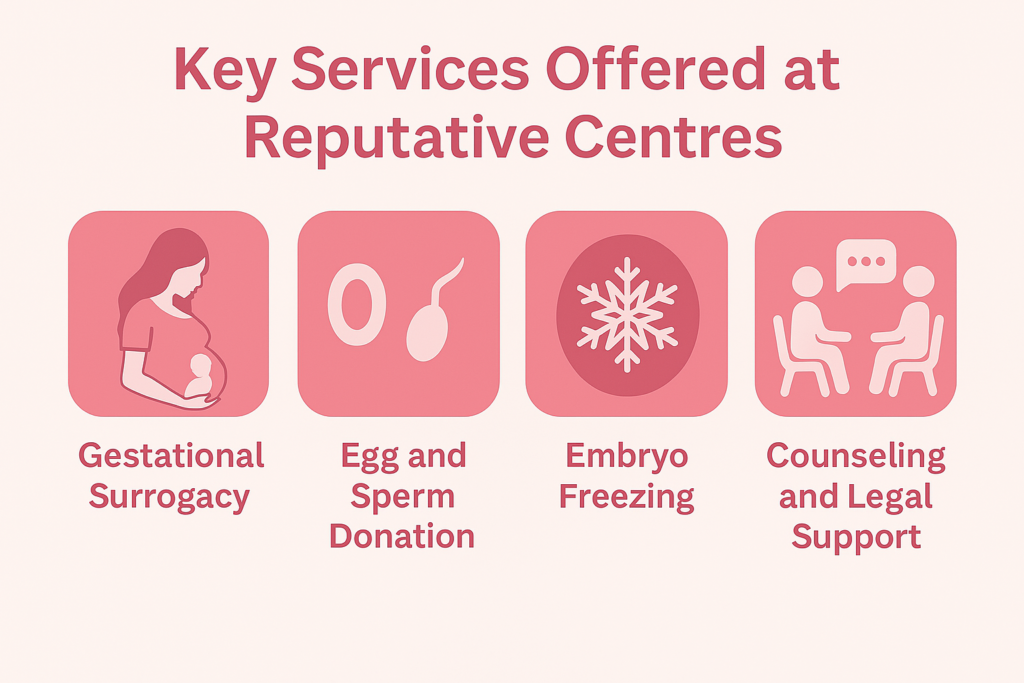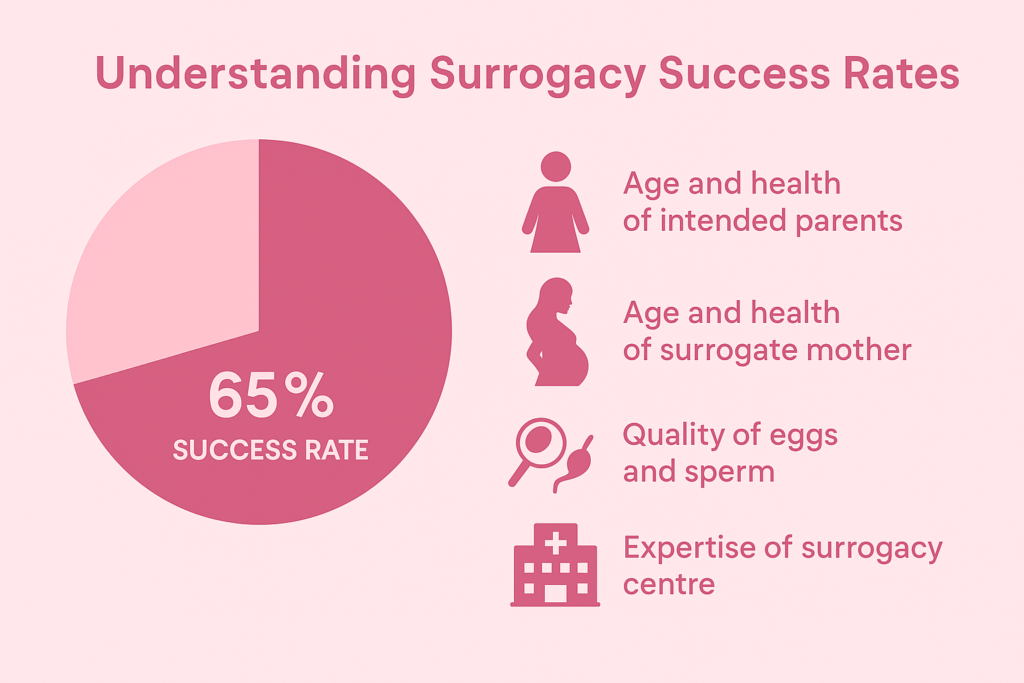The dream of holding your own child is a powerful one, and for those facing challenges with natural conception, surrogacy offers a beacon of hope. India has emerged as a significant destination for individuals and couples seeking this path to parenthood, recognized for its experienced medical professionals and commitment to care. This guide aims to navigate you through the landscape of surrogacy centres in India, highlighting what to look for and spotlighting some of the leading institutions that can help you on your journey.
What to Consider When Choosing a Surrogacy Centre
Selecting the right surrogacy centre is a pivotal decision. Here are some crucial factors to keep in mind as you explore your options:

- Comprehensive Services: Look for centres offering gestational surrogacy, which is the most common and legally sound method in India, where the surrogate carries a child genetically unrelated to her. Also, consider if they facilitate egg and sperm donation if needed.
- Success Rates: While many centres boast high success rates, inquire about their specific data, including live birth rates per cycle, and understand the factors influencing these outcomes.
- Advanced Facilities and Technology: Modern IVF laboratories and cutting-edge technologies are essential for successful surrogacy procedures.
- Experienced Medical Team: The expertise of fertility specialists, embryologists, and support staff is paramount. Many leading centres have internationally trained professionals.
- Patient Reviews and Testimonials: Hearing from previous patients can provide valuable insights into the centre’s care, support, and overall experience.
- Ethical and Legal Practices: Ensure the centre adheres to the current surrogacy laws in India, which permit altruistic surrogacy where the surrogate is compensated only for medical expenses and insurance.
Spotlight on Top Surrogacy Centres in India
India is home to numerous reputable surrogacy centres, with several located in major metropolitan cities.
Top Surrogacy Centres in India
| City | Centre Name | Location | Specialties/Highlights |
| Delhi | Elixir Fertility Centre | Gujranwala Town 1 | IVF, IUI, ICSI, Surrogacy, high success rate |
| Delhi IVF and Fertility Research Centre | Bengali Market | Altruistic surrogacy, affordable, experienced team | |
| Akanksha IVF Centre | Janakpuri | Personalized care, supportive environment | |
| Advance Fertility and Gynecology Centre | Lajpat Nagar | Led by Dr. Kaberi Banerjee, advanced tech | |
| Surrogacy Centre India (SCI) | Multiple Locations | High surrogacy birth numbers, patient-focused | |
| Mediworld Fertility | Safdarjung Enclave | Transparent pricing, experienced specialists | |
| Ferticity | South Delhi | Advanced facilities, skilled professionals | |
| Zeeva Clinic | Noida | Ethical and legal practices | |
| International Fertility Centre (IFC) | Delhi | Leading centre, exceptional success rates | |
| Aveya | Delhi | Altruistic surrogacy, financial consultation | |
| Srijan IVF Centre | Mayur Vihar | Comprehensive fertility services, patient-centric care | |
| Invitro Baby Fertility Centre | Greater Kailash | Known for personalized fertility solutions | |
| Ridge IVF | Kamla Nagar | Advanced IVF and surrogacy, experienced specialists | |
| Fortis Ridge Fertility & IVF Centre | Shalimar Bagh | High-tech fertility care under a reputed hospital chain | |
| Femme9 Care & Cure Clinic | Gujranwala Town | Ethical surrogacy, expert consultation, supportive approach | |
| Mumbai | Saraogi Hospital | Mumbai | High success, installment payments |
| IRIS IVF Centre | Mumbai | 360-degree surrogacy support (legal & emotional) | |
| Ankoor Fertility Clinic | Mumbai | Trusted guidance & support | |
| Zoi Fertility & Surrogacy India | Mumbai | First specialty clinic, legal/documentation help | |
| Gynaecworld | Mumbai | Gestational surrogacy, thorough screening | |
| Mumbai Fertility Clinic & IVF Center | Mumbai | Legal compliance, celebrity clients | |
| Akruti IVF Centre | Mumbai | Notable centre | |
| Aarush IVF & Endoscopy Centre | Mumbai | Notable centre | |
| Others | Various Centres | Bangalore, Chennai, Hyderabad | Reputable surrogacy services available |
Key Services Offered: Your Comprehensive Support System
Reputable surrogacy centres offer a wide array of services to support you throughout your journey :

- Gestational Surrogacy: The primary method offered, ensuring no genetic link between the surrogate and the baby.
- Egg and Sperm Donation Programs: Strict screening processes for donors are followed for those requiring donor gametes.
- Embryo Freezing (Cryopreservation): Providing flexibility for future family planning.
- Legal Support and Guidance: Navigating the legal framework is crucial, and expert legal teams assist with agreements and compliance.
- Counseling Services: Addressing the emotional aspects of surrogacy for both intended parents and surrogates.
Understanding Surrogacy Success Rates
Success rates in surrogacy are a significant consideration for intended parents. These rates typically refer to the percentage of embryo transfers that result in a live birth. However, it is important to understand that these figures can vary widely depending on several factors. The age and health of the intended parents, particularly the female partner providing the egg, play a crucial role.

Similarly, the age and health of the surrogate mother are important determinants of a successful pregnancy. The quality of the eggs and sperm used for fertilization also significantly impacts the outcome. Finally, the expertise and protocols followed by the specific surrogacy centre can influence success rates. While many centres advertise their success rates, it is prudent to inquire about detailed statistics relevant to your specific situation and to understand the methodology behind the reported numbers.
Top-Notch Facilities & Expert Medical Teams
Great surrogacy centres stand out because of two key things: advanced technology and experienced professionals. Modern IVF labs with the latest tools help in successful fertilization and healthy embryo development. High-tech imaging allows doctors to closely monitor every step of the process. Plus, strict hygiene and cleanliness are maintained to keep everyone safe from infections.
But it’s not just about machines — it’s about people too. Skilled fertility doctors know how to handle complicated cases and design treatments tailored to each individual. Expert embryologists carefully manage every step of the IVF and embryo transfer process. And a caring team of nurses and counselors supports intended parents and surrogates at every stage, making the entire journey smooth, safe, and comforting.
Legal Aspects of Surrogacy in India

Surrogacy laws in India have changed over the years to make the process safer and more ethical. According to the Surrogacy (Regulation) Act, 2021, only altruistic surrogacy is allowed. This means that the surrogate mother cannot be paid, except for medical expenses. Commercial surrogacy, where surrogates are paid for carrying a baby, is banned in India. Only Indian married couples who have been together for at least five years can opt for surrogacy. Single parents and foreign nationals are not allowed to undergo surrogacy in India. Legal approval is required before starting the process.
What Patients Say
The experiences of individuals and couples who have undergone surrogacy at various centres offer invaluable insights. Many testimonials highlight the compassionate and supportive environment provided by the staff. Patients often express gratitude for the empathy shown by the medical teams and the clear guidance offered throughout the process. The realization of the long-cherished dream of parenthood is a recurring theme in these personal accounts. These positive reviews underscore the importance of choosing a centre that not only possesses medical expertise but also prioritizes the emotional well-being of intended parents.
Navigating the Financial Aspects: Surrogacy Costs in India
Understanding the costs associated with surrogacy in India is a primary concern for many. The total expense can vary significantly depending on several factors, including the location of the centre, the specific services required (such as the need for egg or sperm donors), and the number of attempts needed.
While historical data might suggest a broader range, the current legal framework of altruistic surrogacy impacts the financial structure. Generally, the cost will encompass medical procedures like IVF and embryo transfer, the surrogate’s medical expenses and insurance, legal fees for drafting agreements and ensuring compliance, and potentially agency fees if one is involved. Compared to many developed countries, India is often considered a more affordable destination for surrogacy, making it an attractive option for intended parents worldwide.
Estimated Surrogacy Cost Breakdown in India
| Cost Component | Estimated Cost Range (INR) | Notes |
| Medical Procedures (IVF, Embryo Transfer) | 7 Lakhs – 8 Lakhs | Varies based on the clinic and specific procedures. |
| Surrogate Medical Expenses & Insurance | 6 Lakhs – 8 Lakhs | Covered by intended parents under altruistic surrogacy. |
| Legal Fees | 4 Lakhs – 5 Lakhs | For drafting agreements and ensuring legal compliance. |
| Medications for Intended Mother and Surrogate | Upto 50 Thousands | Depends on the specific protocols and duration. |
| Other Potential Expenses (Consultations, etc.) | Variable | May include initial screenings and other unforeseen costs. |
Choosing the Right Centre for Your Needs: Important Considerations
Selecting the ideal surrogacy centre requires careful consideration of your individual needs and circumstances. Revisit the key factors discussed earlier: the range of services offered, transparent success rates, the quality of facilities and technology, the expertise and experience of the medical team, positive patient reviews, ethical practices, and legal compliance. It is advisable to prepare a list of questions to ask potential centres, focusing on aspects that are most important to you. A personal consultation with the centre’s representatives can provide valuable insights and allow you to assess your comfort level with their approach and team. Trusting your instincts and choosing a centre where you feel supported and confident is paramount for a positive surrogacy experience.
Conclusion: Taking the Next Step Towards Your Dream Family
The journey to parenthood through surrogacy in India is a well-trodden path, offering hope and the possibility of building your dream family. By understanding what to look for in a leading surrogacy centre and exploring the options available, you can take informed steps towards this life-changing experience. Remember to prioritize centres that offer comprehensive care, demonstrate ethical practices, and provide the support you need throughout your journey.
Frequently Asked Questions (FAQ)
Q.1 Is surrogacy 100% successful?
Ans. Surrogacy is not 100% successful, as various factors influence its outcome. The success rate depends on the quality of the embryo, the health of the surrogate mother, and the expertise of the fertility clinic. On average, the success rate of surrogacy in India ranges from 50% to 70%. Choosing a reputed surrogacy centre with experienced specialists can improve the chances of success.
Q.2 Where is surrogacy legal in India?
Ans. Surrogacy is legal in India but is governed by strict regulations under the Surrogacy (Regulation) Act, 2021. It permits altruistic surrogacy only for legally married Indian couples who face infertility issues. Commercial surrogacy is banned, and foreign nationals are not allowed to pursue surrogacy in India.
Q.3 Which state is best for surrogacy?
Ans. Several states in India have well-established surrogacy centres with high success rates. Cities like Delhi, Mumbai, Bangalore, and Hyderabad are known for their advanced fertility clinics and experienced medical professionals. The choice of the best state depends on the availability of reputed centres, legal framework, and accessibility of medical care.
Q.4 Is surrogacy available in Delhi?
Ans. Yes, surrogacy is available in Delhi at various registered fertility clinics and hospitals. Intended parents must comply with the legal requirements, including medical certification for infertility and adherence to the Surrogacy (Regulation) Act. Delhi has some of the best fertility centres offering advanced medical care for surrogacy procedures.
Q5. Whose sperm is used in surrogacy?
Ans. In gestational surrogacy, the sperm used can be from the intended father or a donor, depending on the couple’s medical condition. If the intended father has fertility issues, sperm donation may be considered. The decision is made based on medical evaluations and consultation with fertility experts.
Q6. Is the surrogate mom the real mom?
Ans. In gestational surrogacy, the surrogate mother is not genetically related to the baby, as the embryo is created using the intended parents’ or donor gametes. The surrogate carries the pregnancy but does not contribute genetic material. This ensures that the intended mother or donor is the biological parent.
Q7. What is the cost of IVF in India?
Ans. The cost of IVF in India varies depending on the clinic, city, and specific medical requirements. On average, a single IVF cycle can cost between INR 1.5 lakhs to INR 2.5 lakhs. Additional expenses may apply for medications, donor sperm or eggs, and embryo freezing. Some clinics offer affordable IVF packages to make treatment accessible to couples facing infertility.

